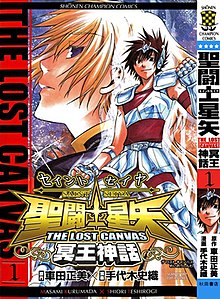| Saint Seiya: The Lost Canvas – The Myth of Hades | |
 Pegasus Tenma and Alone in the cover of the first volume. | |
| 聖闘士星矢 The Lost Canvas 冥王神話 (Seinto Seiya Za Rosuto Kyanbasu Meiō Shinwa) | |
|---|---|
| Created by | Masami Kurumada |
| Manga | |
| Written by | Shiori Teshirogi |
| Published by | Akita Shoten |
| Magazine | Weekly Shōnen Champion |
| Demographic | Shōnen |
| Original run | August 24, 2006 – April 6, 2011 |
| Volumes | 25 |
| Manga | |
| Anecdotes | |
| Written by | Shiori Teshirogi |
| Published by | Akita Shoten |
| Magazine |
|
| Demographic | Shōnen |
| Original run | May 19, 2011 – March 12, 2016 |
| Volumes | 16 |
| Manga | |
| Extra Edition | |
| Written by | Shiori Teshirogi |
| Published by | Akita Shoten |
| Magazine | Red Champion |
| Demographic | Shōnen |
| Original run | Jun 18, 2021 – present |
| Volumes | 1 |
| Original video animation | |
| Directed by | Osamu Nabeshima |
| Written by | Yoshiyuki Suga |
| Music by | Kaoru Wada |
| Studio | TMS Entertainment |
| Licensed by |
|
| Released | June 24, 2009 – July 20, 2011 |
| Episodes | 26 |
Saint Seiya: The Lost Canvas – The Myth of Hades (Japanese: 聖闘士星矢 The Lost Canvas 冥王神話, Hepburn: Seinto Seiya Za Rosuto Kyanbasu Meiō Shinwa), also known as simply The Lost Canvas, is a Japanese manga series written and illustrated by Shiori Teshirogi. It is a spin-off based on the manga series Saint Seiya, which was created, written and illustrated by Japanese author Masami Kurumada. The Lost Canvas was published by Akita Shoten in the Weekly Shōnen Champion magazine since August 24, 2006, concluding after 223 chapters on April 6, 2011, with twenty-five tankōbon released. The story takes place in the 18th century, and focuses on how an orphan known as Tenma who becomes one off the goddess Athena's 88 warriors known as Saints and finds himself in a war fighting against his best friend Alone who is revealed to be the reincarnation of Athena's biggest enemy, the Underworld God Hades.[1]
The manga The Lost Canvas originated when Shiori Teshirogi's works attracted the attention of Saint Seiya author Masami Kurumada who gave her permittion to write a prequel to his work while he was also writing his own prequel Saint Seiya: Next Dimension. Both Teshirogi and Kurumada often exchanged ideas that their works would have. Teshirogi in particular faced difficulties since she previously wrote shōjo manga and had to adapt her writing and artwork to the male demography. Teshirogi also started releasing a spin-off series from Lost Canvas two months after the main serialization ended. Titled Saint Seiya: The Lost Canvas – The Myth of Hades - Anecdotes (聖闘士星矢 The Lost Canvas 冥王神話 外伝, Seinto Seiya Za Rosuto Kyanbasu - Meiō Shinwa Gaiden), the spin-off focuses on short stories related to several Saints before the events described in the main series. On April 23, 2012, it was announced in the Shōnen Champion magazine that The Lost Canvas was to change from a weekly to a monthly publication the following June, and shifting to the newly created magazine Bessatsu Shōnen Champion, supplementary to Shōnen Champion, resuming publishing of the remaining Anecdotes chapters in that date.[2]
In June 2009, TMS Entertainment started adapting the manga in original video animation format, producing 26 episodes, which followed the source material closely and occasionally expanded on it with Teshirogi herself writing these new scenes.
Saint Seiya: The Lost Canvas was a commercial success in Japan, reaching a total of 6.7 million copies sold. Although the critics noted the manga uses heavy recycling characters from Saint Seiya, they believed a given a bigger appeal, most notably the Athena's twelve Gold Saints who play a major role in the narrative in contrast to the ones from the original series. While the plot was still felt simple, the artwork was still praised. The anime adaptation met similar responses by critics who enjoyed Tenma and Alone's relationship but still felt the aimed demography would be shocked to see apparent simplistic moves result into notably violent results. The fact that TMS Entertainment never concluded adapting the manga led to disappointment to its critics
- ^ "No.39 特別定価240円(税込)" (in Japanese). Akita Shoten. Archived from the original on November 16, 2008. Retrieved March 26, 2009.
- ^ http://i42.tinypic.com/345hra8.jpg [dead link] In Japanese, announcement published in Shōnen Champion magazine